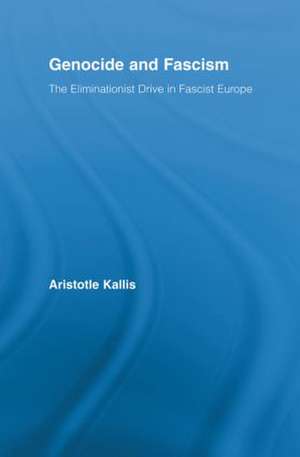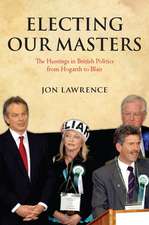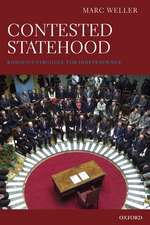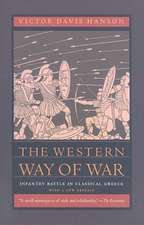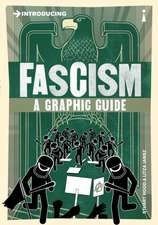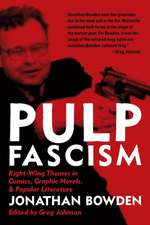Genocide and Fascism: The Eliminationist Drive in Fascist Europe: Routledge Studies in Modern History
Autor Aristotle Kallisen Limba Engleză Paperback – 6 ian 2011
| Toate formatele și edițiile | Preț | Express |
|---|---|---|
| Paperback (1) | 503.56 lei 6-8 săpt. | |
| Taylor & Francis – 6 ian 2011 | 503.56 lei 6-8 săpt. | |
| Hardback (1) | 1285.17 lei 6-8 săpt. | |
| Taylor & Francis – 13 oct 2008 | 1285.17 lei 6-8 săpt. |
Din seria Routledge Studies in Modern History
-
 Preț: 300.70 lei
Preț: 300.70 lei -
 Preț: 326.16 lei
Preț: 326.16 lei -
 Preț: 311.48 lei
Preț: 311.48 lei -
 Preț: 312.12 lei
Preț: 312.12 lei -
 Preț: 303.01 lei
Preț: 303.01 lei -
 Preț: 292.90 lei
Preț: 292.90 lei -
 Preț: 312.61 lei
Preț: 312.61 lei -
 Preț: 152.86 lei
Preț: 152.86 lei -
 Preț: 310.95 lei
Preț: 310.95 lei - 9%
 Preț: 935.05 lei
Preț: 935.05 lei -
 Preț: 327.03 lei
Preț: 327.03 lei - 9%
 Preț: 1006.10 lei
Preț: 1006.10 lei -
 Preț: 315.15 lei
Preț: 315.15 lei -
 Preț: 333.88 lei
Preț: 333.88 lei -
 Preț: 310.22 lei
Preț: 310.22 lei -
 Preț: 309.20 lei
Preț: 309.20 lei -
 Preț: 311.41 lei
Preț: 311.41 lei -
 Preț: 326.67 lei
Preț: 326.67 lei -
 Preț: 311.18 lei
Preț: 311.18 lei -
 Preț: 302.88 lei
Preț: 302.88 lei -
 Preț: 311.70 lei
Preț: 311.70 lei -
 Preț: 295.34 lei
Preț: 295.34 lei -
 Preț: 413.13 lei
Preț: 413.13 lei -
 Preț: 437.13 lei
Preț: 437.13 lei - 31%
 Preț: 764.20 lei
Preț: 764.20 lei - 31%
 Preț: 764.62 lei
Preț: 764.62 lei -
 Preț: 495.09 lei
Preț: 495.09 lei - 31%
 Preț: 762.97 lei
Preț: 762.97 lei -
 Preț: 416.22 lei
Preț: 416.22 lei - 18%
 Preț: 729.55 lei
Preț: 729.55 lei - 30%
 Preț: 823.41 lei
Preț: 823.41 lei -
 Preț: 420.77 lei
Preț: 420.77 lei -
 Preț: 490.40 lei
Preț: 490.40 lei -
 Preț: 416.22 lei
Preț: 416.22 lei - 31%
 Preț: 767.38 lei
Preț: 767.38 lei - 18%
 Preț: 1004.55 lei
Preț: 1004.55 lei - 31%
 Preț: 764.20 lei
Preț: 764.20 lei - 30%
 Preț: 876.36 lei
Preț: 876.36 lei - 18%
 Preț: 1113.91 lei
Preț: 1113.91 lei - 18%
 Preț: 1001.07 lei
Preț: 1001.07 lei - 18%
 Preț: 1000.27 lei
Preț: 1000.27 lei - 30%
 Preț: 820.73 lei
Preț: 820.73 lei - 18%
 Preț: 1000.27 lei
Preț: 1000.27 lei - 18%
 Preț: 1004.55 lei
Preț: 1004.55 lei
Preț: 503.56 lei
Nou
Puncte Express: 755
Preț estimativ în valută:
96.37€ • 104.64$ • 80.95£
96.37€ • 104.64$ • 80.95£
Carte tipărită la comandă
Livrare economică 23 aprilie-07 mai
Preluare comenzi: 021 569.72.76
Specificații
ISBN-13: 9780415890274
ISBN-10: 0415890276
Pagini: 426
Dimensiuni: 152 x 229 x 28 mm
Greutate: 0.79 kg
Ediția:1
Editura: Taylor & Francis
Colecția Routledge
Seria Routledge Studies in Modern History
Locul publicării:Oxford, United Kingdom
ISBN-10: 0415890276
Pagini: 426
Dimensiuni: 152 x 229 x 28 mm
Greutate: 0.79 kg
Ediția:1
Editura: Taylor & Francis
Colecția Routledge
Seria Routledge Studies in Modern History
Locul publicării:Oxford, United Kingdom
Public țintă
Postgraduate and UndergraduateCuprins
Acknowledgments
Introduction: Main Concepts: Fascism, Nation-statism, Eliminationism and ‘Fascist Agency’
Part A – The Overlapping Circles of Nationalism and Race: Constructing ‘Other-ness’ and Rehearsing Elimination
Chapter 1 - Identity and ‘Other-Ness’: From Nationalism to the Elimination of ‘Others’
Chapter 2 – ‘Race’, ‘Nation’ and the ‘Internal Enemy’
Part B – ‘Rebirth’ and ‘Cleansing’: Fascist Ideology and the ‘Licence to Hate’
Chapter 3 - The Fascist Synthesis: ‘Rebirth’, ‘Cleansing’ and the ‘Ideal Nation-State’
Chapter 4 - Imagining Elimination: Fascist Ideologies, the Construction of the ‘Other’ and the ‘Licence to Hate’
Part C – National Socialism: The ‘Uniqueness’ of Synthesis and Implementation
Chapter 5 - The ‘Unique’ German Case: Long-Term Trends and NS Agency
Chapter 6 - The Radicalisation of the NS Project of Elimination and the ‘Licence to Kill’
Part D – Genocide, Agency, and ‘License’ in the NS ‘New Order’ (1939-45)
Chapter 7 - National Eliminationist Projects and the Emergence of The NS ‘Agentic Order’
Chapter 8 - The Fascist State as ‘Agent’: Collaborationism and Genocide
Chapter 9 - Fascist Disciples as ‘Agents’: The ‘Fifth Column’ of the NS New Order
Chapter 10 - ‘Licence to Kill’ and ‘Ordinary People’: The ‘Carnival’ of Eliminationist Violence
Conclusions
Notes
Bibliography
Index
Introduction: Main Concepts: Fascism, Nation-statism, Eliminationism and ‘Fascist Agency’
Part A – The Overlapping Circles of Nationalism and Race: Constructing ‘Other-ness’ and Rehearsing Elimination
Chapter 1 - Identity and ‘Other-Ness’: From Nationalism to the Elimination of ‘Others’
Chapter 2 – ‘Race’, ‘Nation’ and the ‘Internal Enemy’
Part B – ‘Rebirth’ and ‘Cleansing’: Fascist Ideology and the ‘Licence to Hate’
Chapter 3 - The Fascist Synthesis: ‘Rebirth’, ‘Cleansing’ and the ‘Ideal Nation-State’
Chapter 4 - Imagining Elimination: Fascist Ideologies, the Construction of the ‘Other’ and the ‘Licence to Hate’
Part C – National Socialism: The ‘Uniqueness’ of Synthesis and Implementation
Chapter 5 - The ‘Unique’ German Case: Long-Term Trends and NS Agency
Chapter 6 - The Radicalisation of the NS Project of Elimination and the ‘Licence to Kill’
Part D – Genocide, Agency, and ‘License’ in the NS ‘New Order’ (1939-45)
Chapter 7 - National Eliminationist Projects and the Emergence of The NS ‘Agentic Order’
Chapter 8 - The Fascist State as ‘Agent’: Collaborationism and Genocide
Chapter 9 - Fascist Disciples as ‘Agents’: The ‘Fifth Column’ of the NS New Order
Chapter 10 - ‘Licence to Kill’ and ‘Ordinary People’: The ‘Carnival’ of Eliminationist Violence
Conclusions
Notes
Bibliography
Index
Notă biografică
Aristotle Kallis is Senior Lecturer in European Studies at Lancaster University. His publications include National Socialist Propaganda and the Second World War (2005) and The Fascism Reader (2003), as well as articles and essays on the history of fascism, genocide, and propaganda.
Descriere
This book investigates how fascism -- as an ideology and political praxis -- reconfigured the ideological, political, and moral landscape of interwar Europe, generating an atmosphere of extreme ‘license’ that facilitated the leap into eliminationist violence.
